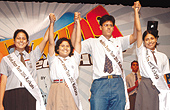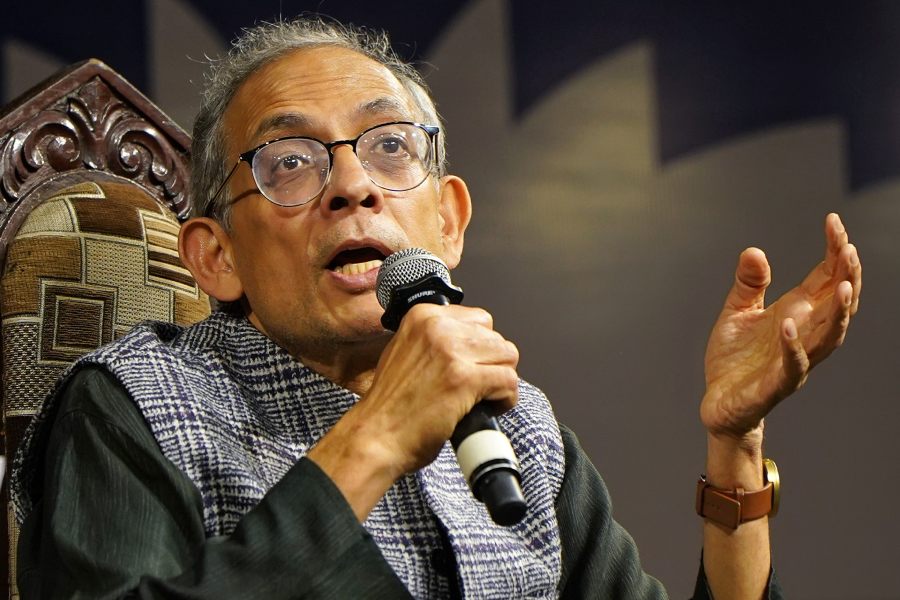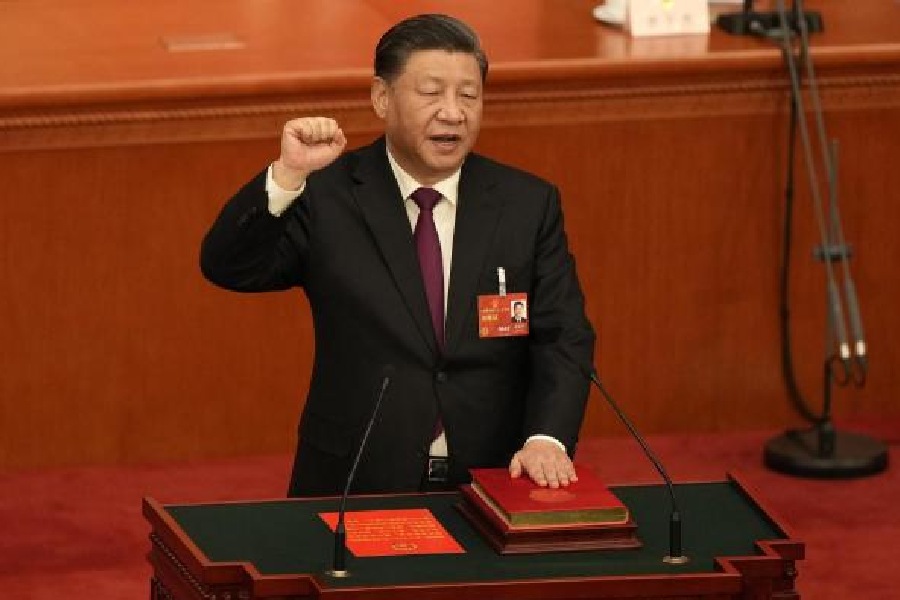 |
| Akashlina Maity, Agniva Ghosh, Kushal Agarwal and Nabomitra Dey (from left) celebrate their victory at the Horlicks Activity Fest on Sunday evening. The four school students emerged winners in the two-day contest and will go on to compete in the national finals in Bangalore. Picture by Sanjoy Chattopadhyaya |
Being one among 15 students from nine institutions in Assam, Jharkhand and West Bengal chosen to represent India in the sixth year of the Indo Swinton Exchange Program organised by DEAS (Duke of Edinburg Award Scheme) also known as the IAYP (International Award for Young People), I had the time of my life during our three-week trip to the UK.
We were received by our British counterparts on June 30 and stayed at their homes in the picturesque town of Swinton in South Yorkshire. A delightful three-day stay at my exchange friend Jamie’s home was interspersed with visits to the Swinton Community School, local tourist spots, the largest private home in England (falling just a foot short of Buckingham Palace) and a backyard party at exchange friend Vicky’s home. On July 3, we set out for the International Camp for Children in Glaramara, Lake District.
The action centred around 40-odd children 10-12 years old, from Italy and Macedonia, who were under the charge of us students from India and Swinton. The first two days we worked in unison, pitching tents and making arrangements for the children’s camp. Then, it was a daily plethora of activities. Canoeing, gorge-scrambling, absailing and mountaineering, we relished everything. The many things we learnt about each other was even more precious for me as Indian culture fascinated the Europeans.
The third event, the International Camp, also at Glaramara, had students from 10 countries. It kicked off on July 11 with a traditional English dance and an evening of entertainment at the Doncaster College. Next morning, we were divided into groups and led by the English students in another round of adventure sports.
Canoeing amidst the most beautiful valleys in England, raft-making and rafting, absailing, climbing up single rocks 50 ft high, mountaineering, experiencing sunsets at 8 pm and sightseeing around the pristine Derwent Lake on the northern fringes of England was truly wonderful.
Two nights we drove up to the town of Keswick for fun and frolick. The rest went by in making presentations of each other’s countries. The flamboyant fashion show of Indian attire by the boys and a mesmerising dance by the girls stole the show. We too, collected varied tit bits of information — Skopje, capital of Macedonia, is the birthplace of Mother Teresa, not, as popularly claimed, Albania.
While the English and Indian students played cricket everyday, much to the amusement of others, we learnt softball, the English version of baseball. A very reluctant farewell party later, we set off for London via Swinton on July 16. Our three-day sojourn in London comprised visits to Madame Tussuads, Piccadilly Circus, the theatre and Buckingham Palace. Finally, on July 20, we were home.
Sangeet Shirodkar,
Apeejay School
The ‘wow’ factor
 |
| A panel of experts advises students on going abroad for higher education at Oxford Bookstore. Picture by Rashbehari Das |
Imagine getting world-class customer service in your neighbourhood sweet shop or the bus conductor giving you the ticket with a polite “thank you”, and your reaction will probably be “wow!”.
At a workshop organised for the hotel management students of Institute of Advanced Management (IAM) in Salt Lake recently, the trainers aimed to inculcate what they call the ‘wow’ effect in people by teaching them a fresh approach to interpersonal skills. It basically involves supplying a little finesse in our dealings with people.
The joint effort of IAM and LauncherZ, a Calcutta-based communications and soft skills institute, comprised sessions on interview skills, body language, crises handling and “realising the wow-factor within ourselves”. The idea was training in combining work with enjoyment.
A LauncherZ trainer said that in Calcutta we encounter mostly the ‘ouch’ effect or at best the ‘okay’ effect. Hence, the need to develop situation-based skills. The mock interviews conducted were particularly helpful, since human skills were the focus.
Souvik Mukherjee
Date with debate
July 30 was the date for the Derozio Memorial Extempore Contest at Frank Anthony Public School. Students from 33 schools took part. We were given the topic one hour before. My topic was “I will tell you why I am going to win this contest...”
A boy from St James grabbed the first position, while MB Girls and Future Foundation came first and second. It was organised by the All India Anglo Indian Association. Students and teachers of various schools made up the cheerful and encouraging audience. The topics were a combination of serious and humourous subjects.
Goldy Bhowmik,
Class X, Sri Aurobindo Institute
The Women’s Coordinating Council had organised the annual Renuka Ray Memorial Award Debate on July 24. The motion for the debate was ‘In the opinion of the house, gender equality in today’s world is a fiction’. The speakers were from Bidhannagar, Lake Town, Vivekananda, Gokhale Memorial, NUJS, St Xavier’s, Sri Shikshayatan, Rani Birla and Loreto colleges, voicing their views in Bengali and English.
After a heated exchange of opinions, the Loreto College duo of Rudhira Mitra and Shaon Roy Chowdhury was adjudged the best team. Harsha Aditya Poddar of NUJS was awarded best speaker. Vivekananda and Loreto colleges bagged the trophies for the second and third best speakers.
Radhika Basu Thakur,
2nd-year English (hons), Loreto College
The east zone selections for the Frank Anthony Memorial All India Debate Competition was held on August 6. Conducted by the ICSE, it was hosted by Mahadevi Birla Shishu Vihar. The participants included MHS and Loreto Eliot Road. The proposition was ‘In the opinion of the house, today’s education is not only confined to textbooks’. After animated arguments, St Xavier’s, Patna, won the prizes for best team and first and second best speakers. Shruti Agarwal from MBSV was the third best speaker. The top team will be in the national finals in Gurgaon next month. The debate ended with the judges, including theatre personality Dolly Basu, giving useful tips on public speaking.
Talk time
 |
Summer was a season of seminars in Lady Brabourne College. The English department had organised one on ‘Elizabethan Drama: Text and Context’. Abhijit Sen, professor of English literature, Visva-Bharati started the proceedings. Sabita Majumdar spoke on ‘The English History Play: A Reconsideration’, Anasuya Guha threw light on ‘Cross Dressing in Shakespeare’ and Indrani Chaudhuri Dutt discussed the improbability of the action in Twelfth Night.
The maths department went from improbable to real with a session on ‘Real Numbers’ delivered by Prof Jyoti Das. Finally, the philosophy department expounded on ‘Liberty before Liberation’. Prof Bhaskar Chakroborty spoke on ‘The Ideological Foundation of Modern Liberal Thought’.
Ranjana Das,
Lady Brabourne College
“The practical world outside is much more complicated. It’s not difficult, it’s different.” These were the words of wisdom from Prof Amitabha Mukherjee, head of department, accountancy, SXC. He addressed the under-graduate students with his usual rhetoric during a workshop on AS 19 (lease accounting) and AS 22 (deferred taxation). It was an attempt to translate knowledge into skill. Helping us were two other professors, Ashis K. Bhattarchyya (IIMC) and Santanu K. Ganguli. If accountancy is the language of communication, then accounting standards are the syntax, said Prof Santanu. The best part was the interactive session, where our confused queries were answered in a lucid manner by the two experts.
Anurag Singal & Vikram Paharia,
2nd-year B.Com, St Xavier’s College
project report
 |
Meet a shooting star
The four board members of the Interact Club of South Point High School and children from three NGOs had an unforgettable Sunday afternoon recently. They were all waiting eagerly in the lobby of a city hotel to meet none other than Mandira Bedi, the ‘first lady of cricket’ and a television star. She was in town for Bless a Child Banquet, a charity auction of cricket memorabilia, which was to be held in the evening. She took time out from her hectic schedule to meet the under-privileged children. The youngsters had a gala time, thrilled to meet the actress they had seen on TV many a time, be it on Kyunki Saas... or the cricket World Cup 2003. Under the leadership of president Ayush Goenka, the club has started with a big bang this year, and will come out with flying colours.
Nikunj Todi,
Class X, South Point High School











